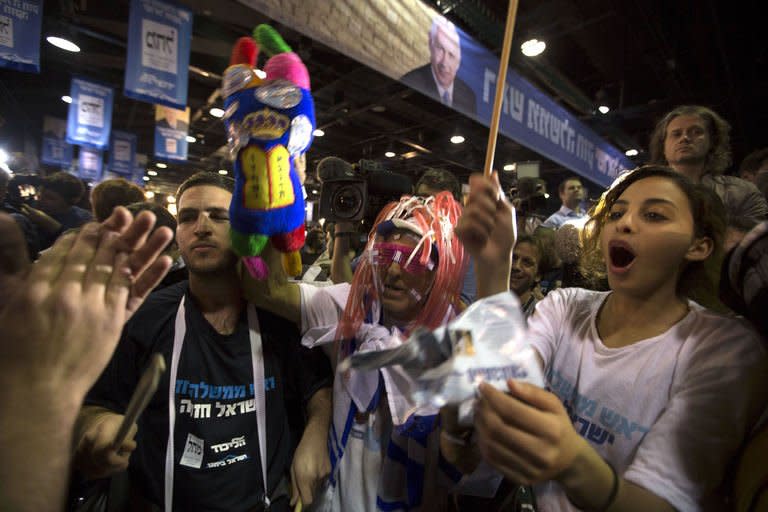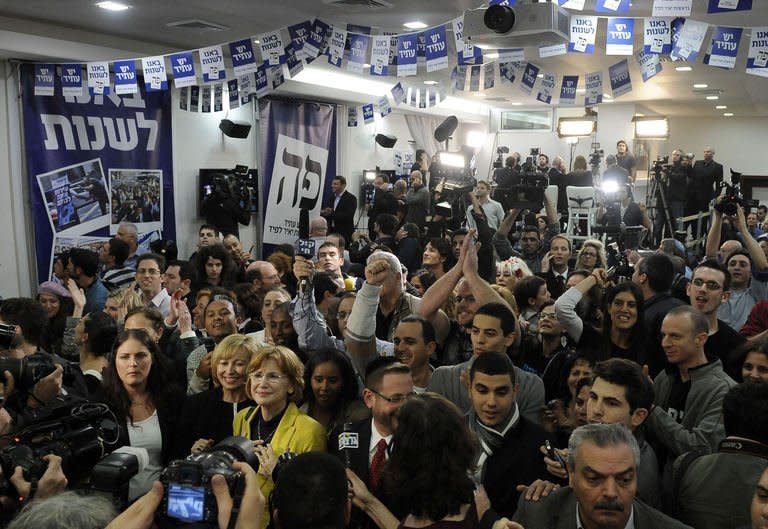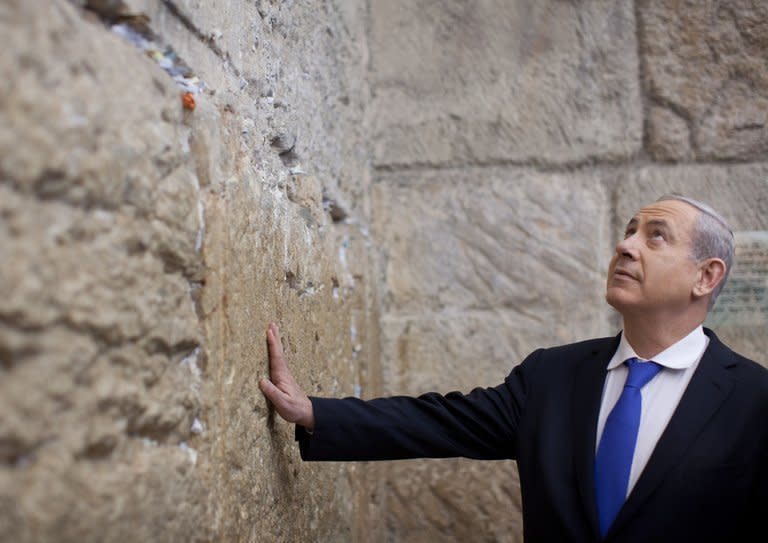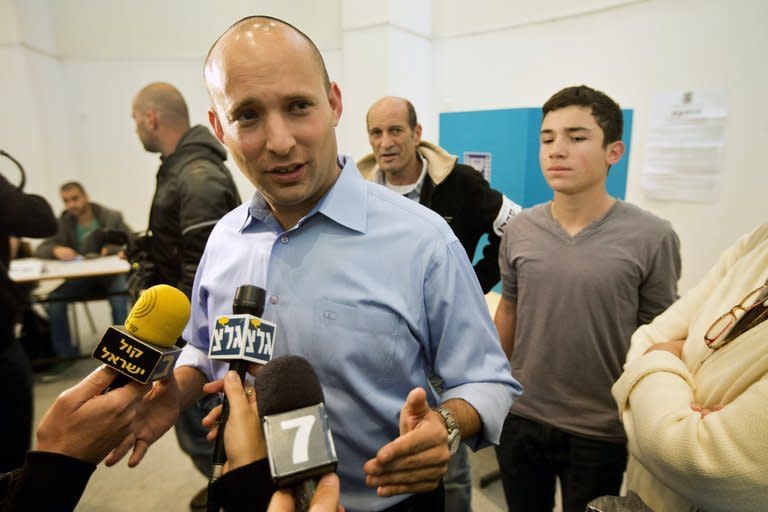Israeli election: Live Report
2340 GMT: It's been a happy evening for the centrists of Yesh Atid and a more mixed one for other parties in Israel's crowded slate of political movements. Coalition negotiations over the next week or two will indicate how Yeir Lapid wields his new power and whether Benjamin Netanyahu finds the backing to pursue his right-wing programme. Whoever joins the government will have to deal with a budget crisis, policy on Iran and long-stalled attempts to reach a peace deal with the Palestinians after a drastic expansion of Jewish settlements. We're ending our live report here, but keep following AFP's regular coverage and our Twitter feed at @AFP. 2335 GMT: Israelis voted today for their 19th Knesset, or parliament, with 66.6 percent turning out in unseasonably warm weather to award Benjamin Netanyahu's rightwing Likud-Beitenu list a narrow victory. But the centrist Yesh Atid, which campaigned on economic issues and was only founded last year, produced an unexpectedly strong result -- weakening the Netanyahu-led bloc, which had been riding high in polls ahead of the vote. Exit polls released by Israel's three main television stations showed Likud-Beitenu winning just 31 seats, down from 42 in the outgoing coalition, while Yesh Atid came in second with 18-19, followed by the centre-left Labour in third place with 17. Netanyahu declared victory, setting out his priorities and saying he would start to assemble a coalition. Like him, Yeir Lapid, leader of Yesh Atid, called for the broadest possible coalition -- but the leader of Labour called for a coalition excluding Netanyahu. 2332 GMT: And now that we've heard from the key party leaders, it looks as though politicians (and journalists) will go home for some sleep. But there's still a great deal to play for, with moves towards possible coalitions underway. We'll be closing our live report shortly, but will first bring you a summary of the day's events... 2330 GMT: And a little more from Netanyahu: "You have proved again that Israel is a lively and dynamic democracy, and I am proud to be your prime minister," he said. "I am proud to have the oppurtunity for the third time to lead the state of Israel." After preventing Iran from creating a nuclear weapon, he said his second concern was financial responsibility -- followed by finding "real peace" with the Palestinians. His speech was accompanied by ecstatic drumming and shouting from about 100 supporters. 2327 GMT: And from Labour leader Shelly Yachimovich, bumped down into third place by Yesh Atid: "There is a great opportunity to form an alternative government to Netanyahu's government. "I will do all that I can to get all the forces that will block an extreme, capitalistic coalition that is cruel to its citizens," she tells supporters, saying she called Lapid to congratulate him. "We are talking about a fragile difference between blocs. There is a very high chance that tomorrow morning Netanyahu won't be able to form a coalition," she says. "I'll do everything to make it happen, to form a government that will be socially-oriented and that will restart a peace process. There are forces that can come together to do it, because as long as Netanyahu is premier, nothing will change." 2325 GMT: Yair Lapid, of Yesh Atid, has also called for a broad coalition: "I call on political leaders to work with me, together, to form the widest possible government which will include moderate elements from the left and the right to bring about real change," he told supporters in Tel Aviv. 2305 GMT: "The government that we shall form will be based on five principles: first challenge... to prevent a nuclear Iran," says Netanyahu, referring to Tehran's civilian nuclear programme, which Israel and much of the West sees as a guise for developing a weapons capability. 2246 GMT: NEW ISRAEL GOVERNMENT'S FIRST PRIORITY TO STOP IRAN GOING NUCLEAR: NETANYAHU 2243 GMT: WE NEED TO FORM 'BROADEST POSSIBLE GOVERNMENT': NETANYAHU 2237 GMT: Yesh Atid's election night HQ in Tel Aviv is overflowing with journalists and activists. Accompanied by drums, activists have been chanting the slogan: "There is a future (yesh atid), we come to change things." Lapid himself is greeted with confetti, cheers and shouts of "future prime minister". 2233 GMT: And at exactly the same time, Yair Lapid begins his victory speech… 2232 GMT: Netanyahu has entered Likud's election night HQ, to thunderous drumming and blowing of whistles from young activists. 2219 GMT: Some more on Lapid: he was a news anchor before quitting TV to start his political party. The son of a former justice minister, he's taken up the mantle of defending Israel's middle class; his campaign was heavily oriented towards the economy. The 49-year-old has placed some emphasis on secularism, but not as heavily as his father, who ran a fiercely secular party. Earlier this month, he told the Jerusalem Post he would not enter a government "as the figleaf of a coalition which is constructed of ultra-Orthodox and ultra-right and me." 2205 GMT: Many pundits had predicted that Naftali Bennett would be this election's star, and instead, it's Yair Lapid. But left-leaning newspaper Haaretz is among those Israeli outlets that saw what was coming. It published an opinion piece on Monday headlined "While you all were busy with Bennett" by editor-in-chief Aluf Benn, which said: "It now looks as if the big winner in tomorrow's election for the 19th Knesset is going to be Yair Lapid. "While the media and the campaign broadcasts were focusing on the battle between Prime Minister Benjamin Netanyahu and his latest model, Naftali Bennett, Lapid was conducting a focused, quiet campaign that didn't garner too much attention." 2159 GMT: About 300 activists are at Jewish Home's election night gathering, says our reporter Michael Blum. As exit polls were unveiled, they chanted "We love Bennett" -- their party leader, Naftali Bennett -- but a feeling of disappointment has since set in. The hard-right party had expected more seats than the 12 they appear to have won, according to exit polls. Shuli Moalem, number 12 on their candidate list -- so she's narrowly won a seat, if exit polls are correct -- tells AFP: "Jewish Home has grown a lot. It's now a party that will have influence -- I hope we will be in a place to make good decisions for the Jewish people." 2154 GMT: At Labour headquarters, there's disappointment over their party's apparent demotion to the country's third largest after Yesh Atid. TV reports say leader Shelly Yachimovich is sticking with her resolution not to join a coalition with Benjamin Netanyahu and Likud. The centre-left social democrats at Labour favour the creation of a Palestinian state. 2142 GMT: Our reporter Fanny Carrier at the Yesh Atid campaign HQ has been talking to candidate Karin Elharar, who is bowled over by the party's success. "I cannot breathe," she says. "It's a major surprise. We knew we had a good programme and that the Israeli people needed change, but this is stronger than we could have believed." 2133 GMT: AFP reporter Jonah Mandel (@mandeljonah) tweets: "Final voting rate in #Israel was 66.6%, catchy number but not dramatically higher than last vote, contrary to predictions." 2116 GMT: Prime Minister Benjamin Netanyahu says he has called Yair Lapid, head of the centrist Yesh Atid party, which is the surprise second-place winner according to exit polls (which may still prove off the mark). Netanyahu says on Facebook that he told Lapid: "We have an opportunity to do great things for Israel. The election campaign is behind us, and we can now focus on action for the benefit of all of Israel." Looks like an attempt to recruit Yesh Atid into a coalition: the ball is now in Lapid's court. 2109 GMT: Likud lost seats because it "didn't respect its direction, its platform. That's the reason for the fall," says central committee member Emmanuel Gertel. Reporters ask him whether it was a mistake joining up with the Yisrael Beitenu party and its leader, firebrand hardliner Avigdor Lieberman. "There was no choice, there was a danger that Likud (on its own) wouldn't be the biggest party," says Gertel -- meaning that President Shimon Peres might then have turned to another party to try to form a government. 2107 GMT: The results for Netanyahu's Likud party are "a big disappointment", according to central committee member Emmanuel Gertel. The party's joint list with hardline secular nationalist party Yisrael Beitenu appears to have won 31 seats. Previously, when the two parties ran separate lists, they had a total of 42 seats between them. "It's simple arithmetic, a drop of 11 seats," says Gertel. 2105 GMT: Yair Lapid, head of Yesh Atid, has a brief initial response to his success predicted in exit polls: on Facebook, he posts "Thank you." 2102 GMT: Israeli coalition discussions normally take a week or two, so we won't see the final shape of the next government tonight, but we will get more reactions from parties to the exit polls. Official results are expected in the early morning Israeli time, some time after 0230 GMT. 2100 GMT: Israel's political system doesn't specify that the party with the most votes is guaranteed to form the next coalition, but Netanyahu is still widely expected to be handed the task of pulling together 61 MPs to form a majority. But given the upsets in the exit polls, he could be drawing together a centre-right government, rather than tacking further to the right, as analysts had predicted. 2053 GMT: More from Jewish Home: Dina Cohen, director of the party's Francophone committee, tells AFP: "We are pleased with this result even though we were hoping for more. "I have no doubt that we will be part of Bibi (Netanyahu)'s next government. We share the same values." 2048 GMT: AFP's Michael Blum reports from Jewish Home's electoral HQ -- in Ramat Gan near Tel Aviv -- that there's a party atmosphere following the exit polls, with flags, party favours, the party jingle playing on a loop and MPs-to-be congratulating each other. Although their rise has been somewhat eclipsed by that of Yesh Atid, the 12 seats scored by Jewish Home -- according to exit polls -- still represent a big jump from the three seats they held in the outgoing parliament. 2047 GMT: Amit Segal, political correspondent for Israel's Channel 2, points out that there is usually another seat or two for the right in final results -- compared with exit polls -- because of votes from soldiers. He believes the vote indicates that the Israeli public supports Netanyahu's political positions, but objects to him as an individual. 2043 GMT: As results of exit polls flashed up on TV in the Likud centre, reports AFP's Stephen Weisman, a group of young Likud activists pounded on drums and danced, chanting "come on Bibi!" (haideh Bibi) -- referring to Netanyahu -- despite what on the face of it would seem to be a disappointing showing. 2039 GMT: With 18 or 19 Knesset seats, Yair Lapid, political newcomer and head of the centrist Yesh Atid party, could be in line either to be opposition leader or to take on a major cabinet post. The rise of Yesh Atid to become the second-biggest party has surprised pundits, who had said that the hard-right Naftali Bennett, of Jewish Home, would be this election's star. 2037 GMT: Netanyahu pledges to create a coalition "as broad as possible". "I wish to thank millions of Israelis who realised their democratic right today," he says on his Facebook page. "Based on the results in the exit polls, it's clear the citizens of Israel determined they want me to continue as prime minister, and that I form a government as wide as possible," he writes. 2030 GMT: NETANYAHU THANKS ISRAELIS FOR 'REELECTING' HIM 2024 GMT: More about Yesh Atid: set up just last year, this party has a liberal economic outlook with a focus on supporting the middle class. It wants to see the ultra-Orthodox share the burden of military service: until recently they could avoid it by enrolling in religious seminaries. The party supports resuming talks with the Palestinians. It looks as if Aluf Benn, editor of the left-leaning newspaper Haaretz, was right when he tweeted earlier: "Bibi failed to realize that (Yair) Lapid (head of Yesh Atid) is his main rival, and not Bennett. Lapid campaigned under everybody's radar." 2020 GMT: Israeli journalists on Twitter are saying that last exit poll leaves the rightwing-religious bloc with 61 seats in the 120-seat Knesset: a slim majority. 2017 GMT: Channel 2's exit poll is slightly different. Here it is (see below for explanations of what the parties represent): Likud gets 31 seats, Yesh Atid 19, Labor 17, Jewish Home 12, Shas 11, Tzipi Livni's party 7, and Meretz 7. 2009 GMT: The success of Yesh Atid looks like the surprise here! The rest of that exit poll now: Shas, an ultra-Orthodox Sephardi party, gets 13; hard-right Jewish Home, headed by Naftali Bennett, gets 12; Hatnuah, headed by ex-foreign minister Tzipi Livni, gets 6; left-wing Meretz gets 6; United Torah Judaism, an ultra-Orthodox Ashkenazi party, gets 6. Hadash, an Arab-Jewish socialist alliance, gets 5; Arab nationalist party Ram Tal gets 4; and secular Arab party Balad gets two. 2007 GMT: An exit poll by Israel's Channel 10 gives the parties seats as follows: The ruling Likud party gets 31 -- on the lower end of its expectations -- while Yesh Atid, the centrist party set up in 2012, gets 18 and centre-left Labour gets 17. 2001 GMT: ISRAEL'S NETANYAHU LEADS BUT WEAKENED BY CENTRISTS: TV EXIT POLLS 1958 GMT: "That sound you hear? Journalists rewriting Israel elections stories, polishing their profiles of Yesh Atid and Yair Lapid," tweets our reporter Sara Hussein (@sarahussein)... 1953 GMT: Less than ten minutes now until polls close. We're expecting to receive the first exit poll results soon after that. 1942 GMT: Dov Lipman, who is number 17 on the candidate list for the centrist Yesh Atid, is red with excitement as he speaks to our reporter Philippe Agret. "We are not jumping around everywhere, we are waiting for the results -- but it shows the party was built the right way, we did the right thing, people in Israel want to change the priorities," he says. Lipman, who wears a Jewish yarmulke and a black suit and tie, moved to Israel from the United States eight years ago. 1934 GMT: The US is sticking to advocating a two-state solution with the Palestinians, and doesn't want to be seen as intervening in the election process. President Barack Obama's spokesman Jay Carney notes that Israel has a "vibrant democracy." "We have to wait and see the makeup of the next Israeli government and how it approaches long-standing, critical issues," including relations with the Palestinians, Carney said. "The United States remains committed, as it has been for a long time, to working with the parties to press forward the goal of a two-state solution. That has not changed, and it will not change." The US is a key backer of Israel, and provider of military aid. 1927 GMT: AFP's Shatha Yaish reports that Arab-Israeli party Balad makes a last-ditch appeal to Arab voters on its Facebook page, amid reports of low turnouts in the sector: "Sixty minutes separate us from the closing of the ballot boxes," the party says. "Everyone's responsibility is to go out and vote, even at the last moment. The situation needs voters, and it's a shared responsibility." 1919 GMT: Israeli radio is reporting that Likud is struggling while Yesh Atid is registering a strong showing. 1914 GMT: In Israel, Google has joined the election party: it has decorated its logo on google.co.il with blue-and-white polling booths and flags (as well as a walking stick and a newspaper). 1900 GMT: Naftali Bennett, the rising star of the right, is the latest to make a last-minute plea to get out the vote. He writes on Facebook: "According to our information, collected now -- Netanyahu is the next prime minister. "The big question is who is partner no. 2: Naftali Bennett or Shelly Yachimovich/Yair Lapid." Yachimovich is from the centre-left Labour party, while Yair Lapid runs the centrist Yesh Atid. "** Go and vote," Bennett's Facebook post concludes. "Help Bennett become the central partner in Netanyahu's next coalition." 1855 GMT: From AFP's Steve Weizman, at Likud's election-night gathering in Tel Aviv: Veteran Likud supporter Yossi Vaknin, 62, from Jaffa enters the conference hall, a blue-and-white Israeli flag draped across his shoulders, a blue-and-white plastic bowler hat on his head and wearing flashing Elton-John-style specs. "I'm a Likudnik since childhood," he tells reporters. "I came to show that we're happy, we're going to get 40 seats, with God's help!" 1853 GMT: Only just over an hour to go until voting ends -- we're expecting the first exit polls not long after that. 1846 GMT: British Foreign Secretary William Hague told his country's parliament today that chances of a two-state solution for Israel and the Palestinians were dwindling. "The changing of facts on the ground, principally settlement construction on occupied land, means a two-state solution is slipping away. "The chances of bringing it about however are not yet at an end but it's very urgent," Hague said. He said this should be the "highest priority" for the United States, adding: "I don't want to speculate about the outcome of an election taking place at the moment in Israel, but I hope whatever Israeli government emerges from that will recognise that we are approaching the last chance to bring about such a solution." 1839 GMT: With two hours of voting left, turnout at 2000 (1800 GMT) was at 63.7 percent, the central elections committee says. In 2009, participation was 59.7 percent, while it was 57% in 2006. 1834 GMT: Labour's Shelly Yechimovich has leapt at the chance to attack Netanyahu, sharing his anxious Facebook status (see our entry at 1810 GMT) and urging voters: "Run to the ballots, a change is possible! Look at Netanyahu's hysterical status. I believe what wasn't possible a few weeks ago -- we can have a government without Netanyahu." 1832 GMT: Our reporter Sara Hussein urges caution on rumours that the centre-left are profiting from the high turnout at the expense of Likud. "Hold your horses, could be electioneering..." she tweets. 1827 GMT: Less than half of Israel's Arabs, who represent a fifth of the population, were expected to vote in today's election -- that could be their lowest-ever turnout. Many feel that in reality they are disenfranchised; they're fed up with being excluded from political decision-making, which has for four years been dominated by rightwing nationalist and ultra-Orthodox parties. "The Arab parties don't represent us well," Samih Taha -- a 23-year-old student who voted in the last legislative election for the Democratic Front for Peace and Equality, a Jewish-Arab socialist alliance better known as Hadash -- told us yesterday. "I don't believe in elections. Even if (the Arab parties) get 18 seats in the Knesset, what can they do or influence? What can we do to change Israeli decisions?" he asked. 1815 GMT: Lot of noise on Twitter and Israeli websites about a strong showing for Yair Lapid, head of the new centrist Yesh Atid, whose name means: "There is a future." "Bibi failed to realize that Lapid is his main rival, and not Bennett. Lapid campaigned under everybody's radar," tweets Haaretz editor Aluf Benn, using Netanyahu's nickname. 1810 GMT: Netanyahu has just posted on his Facebook page in Hebrew: "The Likud's rule is in danger. I ask that you leave everything and go out to vote (Likud) now. This is very important, to ensure Israel's future." 1803 GMT: "Rise of Yair Lapid and @naftalibennett shows that Israelis want new faces in the Knesset," tweets journalist Amir Mizroch. Ex-journalist Yair Lapid heads the centrist Yesh Atid party, which wants to resume talks with the Palestinians. Bennett is much further to the right on the political spectrum; his Jewish Home is the party of choice for Jewish settlers, and is strongly religious and nationalist. 1800 GMT: Voters interviewed by AFP today have been casting their ballots across the spectrum, but many have said they are voting for some kind of change. "I don't expect much change. I'm still hoping for an alternative, a move to the center, for which I'm voting," said Joe Jemal, a 55-year-old doctor voting in Jerusalem's Old Katamon neighbourhood. "But the real problem is apathy. I came early to say that voting is important." 1759 GMT: "Israel voters collect a paper printed their chosen party's symbol, put in envelope, drop in ballot box. Over 30 parties = a LOT of paper!" tweets Sara Hussein of our Jerusalem bureau. 1751 GMT: "A strong prime minister for a strong Israel" reads the banner over the stage at the convention centre in northern Tel Aviv where Prime Minister Benjamin Netanyahu's rightwing Likud party has set up its election-night gathering. The hall has been largely empty but hundreds of reporters from all over the world have been gathering outside, says AFP's Steve Weizman. They'll have to pass through tight security before entering the hall, where Netanyahu will later give what's expected to be a victory speech. 1746 GMT: Turnout stood at 55.5 percent at 1600 GMT, four hours before polls were to close at 2000 GMT, according to the Central Elections Committee. Long queues have been forming outside polling stations, despite a slow start this morning. 1742 GMT: Netanyahu's Likud party is sounding nervous. Israeli media are quoting Netanyahu himself as saying at a polling station: "Reports are showing that voter turnout is lower than average in areas that traditionally support Likud." But Barak Ravid, diplomatic correspondent at Haaretz newspaper, thinks this may be a ploy. "The nervous messages Likud officials are getting out might be a spin to urge their supporters to go and vote," he has tweeted. 1735 GMT: In Jerusalem's trendy Germany Colony neighbourhood, a 32-year-old teacher tells our reporter she'll be voting for hardliner Naftali Bennett. "We are so tired of Netanyahu," says the mother-of-three, while she prefers Bennett because he is "strong but not extreme". "Young families like us can relate to him," the teacher adds. She is not alone. Bennett's rise has been a key theme of this campaign period. His Jewish Home party opposes Palestinian statehood and backs annexing about 60 percent of the West Bank. WELCOME TO AFP'S LIVE REPORT on Israel's general election, in which Prime Minister Benjamin Netanyahu is expected to return to power but to assemble a new coalition that will take a swing to the right. Amid unseasonably warm weather, Israelis are still voting at the more than 10,000 polling stations around the country. Polling stations close at around 2000 GMT and we're expecting the first exit polls shortly afterwards. Opinion polling ahead of the vote predicted an easy win for a joint list bringing Netanyahu's Likud party together with the hardline nationalists of Yisrael Beitenu -- but the pairing was only expected to score 32 seats in the 120-seat Knesset. Factors including a weaker Likud and the rise of 40-year-old Naftali Bennett -- the charismatic leader of the hard-right Jewish Home party -- have led to expectations of a more right-wing government. Such a government will be less likely to seek a peace deal with the Palestinians and could lead to more diplomatic isolation for Israel. It will also have to tackle domestic issues including a budget crisis and anger over spiralling prices. Stay with us for regular updates.











